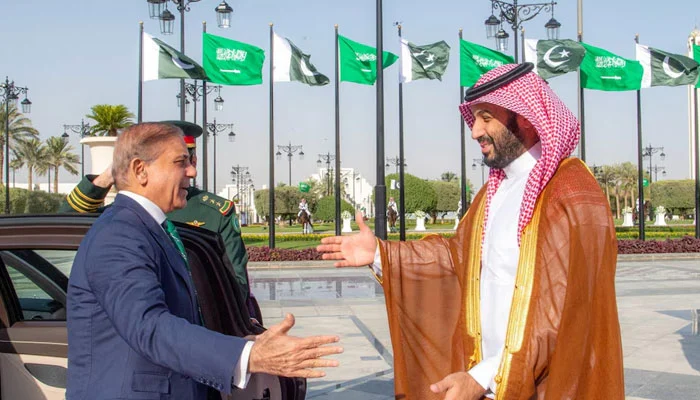In a significant step toward strengthening bilateral relations, Pakistan is preparing to host a high-level Saudi business delegation next month. The initiative comes on the heels of the historic defence agreement signed between the two countries, marking a new chapter of cooperation beyond security ties. The visit is being facilitated by Pakistan’s Special Investment Facilitation Council (SIFC) and aims to enhance trade, investment, and industrial linkages with the Kingdom of Saudi Arabia.
Defence Agreement Sets the Stage for Economic Cooperation
On September 17, 2025, Crown Prince Mohammed bin Salman and Prime Minister Shehbaz Sharif signed a mutual defence pact in Riyadh. This landmark agreement reinforced the decades-old security partnership between the two nations while signaling a desire to expand cooperation into the economic domain. The timing of the accord was particularly significant, as it followed heightened regional tensions caused by Israel’s strikes on Qatar, reshaping the strategic landscape of the Middle East.
The warm reception given to Pakistan’s leadership in Riyadh reflected the Kingdom’s commitment to deepening ties not just in defence but also in trade and investment.
Commercial Desk to Be Established at LCCI
In preparation for the delegation’s visit, officials from the Saudi Embassy in Islamabad met with Mian Abu Zar Shad, President of the Lahore Chamber of Commerce and Industry (LCCI). During the meeting, Saudi Commercial Attaché Naif bin Abdulaziz Al-Harbi announced the establishment of a dedicated commercial desk at LCCI.
The purpose of this desk will be to streamline trade initiatives, facilitate communication, and strengthen linkages between Saudi and Pakistani businesses. Al-Harbi highlighted Pakistan’s untapped economic potential and assured full support from the Kingdom to enhance trade opportunities.
Facilitating Direct Exports from Pakistan
One of the key announcements during the meeting was Saudi Arabia’s plan to enable direct export of Pakistani goods to the Kingdom. Currently, a significant portion of Pakistani exports to Saudi Arabia pass through third-party channels, particularly in Europe, leading to higher costs and delays. By eliminating these intermediaries, Riyadh aims to create a more efficient trade structure, benefitting both exporters and consumers.
Al-Harbi stressed that the initiative would not only reduce costs but also improve the competitiveness of Pakistani products in the Saudi market. He emphasized the importance of creating structured policies to support long-term trade growth while also fostering people-to-people connections between the two nations.
B2B Meetings Across Punjab
According to official sources, the Saudi business delegation will hold a series of B2B meetings with prominent business figures across Punjab. These sessions will be organized in collaboration with the Punjab Board of Investment and Trade and the Lahore Chamber of Commerce.
The plan also includes gathering representatives from chambers of commerce across the province at LCCI, offering a platform for direct interaction with Saudi investors and industrialists. Such initiatives are expected to unlock opportunities in diverse sectors, from agriculture and manufacturing to services and technology.
Trade Over Aid: Pakistan’s Stance
During the discussions, LCCI President Mian Abu Zar Shad underscored the importance of shifting the relationship toward trade rather than aid. “Pakistan doesn’t need aid — it needs trade,” he asserted, emphasizing the long-term benefits of sustainable economic cooperation.
Shad also suggested reviving the maritime ferry service that operated between Pakistan and Saudi Arabia in the 1960s. According to him, restoring this service could significantly facilitate movement, boost commerce, and strengthen cultural ties between the two nations.
A New Era of Economic Collaboration
The upcoming Saudi delegation’s visit represents more than a routine trade mission; it is expected to act as a catalyst for a new era of economic collaboration. Building upon the recently signed defence pact, Islamabad and Riyadh appear determined to expand their partnership into commerce, investment, and industrial cooperation.
With structured B2B interactions, policy-level initiatives, and direct trade facilitation, both countries aim to unlock untapped potential and move toward a more balanced and mutually beneficial relationship.
